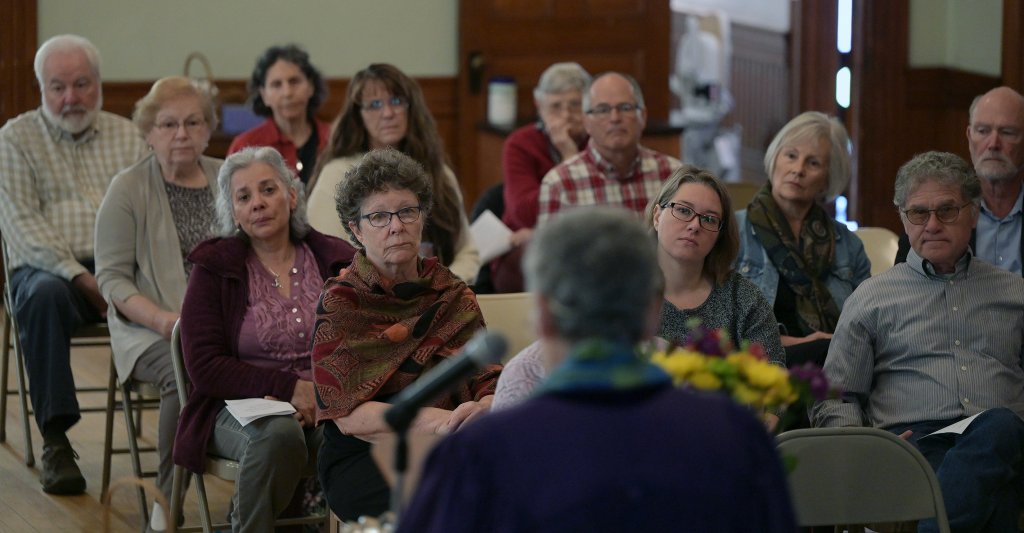PITTSFIELD — The Unitarian Universalist Meeting House is one of the grand buildings in Pittsfield, looming over the town center for more than 100 years.

It is one of four buildings in town on the National Register of Historic Places, according to the Pittsfield Historical Society. But for the dwindling number of people who comprise the church’s congregation, the building on Easy Street is far more than a once stately landmark. It s a spiritual center that has played an integral role in their lives for years.
And that is why these are emotional times for its members, who recently came to the difficult decision they do not have the money for the extensive repairs the meeting house needs, so they will sell the building and become a congregation with no home.
The final service there was Sunday, and its doors are to close to the public Saturday. The congregation is expected to begin gathering at the Pittsfield Public Library in October.
“It’s a very painful time for the congregation,” the Rev. Julianne Bousquet said. “The building is repairable. It is just beyond our means.”
The meeting house is hardly alone in closing. Houses of worship across several faiths in the United States have closed over the past several years for a variety of reasons, perhaps most notably because of decreasing attendance.
In central Maine, the Green Street United Methodist Church in Augusta closed earlier this year because its members no longer had the financial capacity to keep and maintain the property. The church was built in 1828, and the members had hoped it could be used to aid the homeless in some way. The property was listed in April for $985,000. The congregation is continuing to meet elsewhere.

Parishioner Trudy Ferland pulls the rope to ring the bell Sunday following the final service at the Unitarian Universalist Meeting House in Pittsfield. At the right are Christene Burton and her brother, Wesley, also parishioners who also rang the bell. The building is being sold and the congregation is moving its services to the Pittsfield Public Library. About 40 people attended the service. Rich Abrahamson/Morning Sentinel
A few years ago, the Episcopal Church of Saints Matthew and Barnabas in Hallowell was shuttered after the COVID-19 pandemic diminished the church’s capacity to maintain the property. The 160-year-old church also served as a meeting house for Alcoholics Anonymous, which made the building’s closure even more emotional, the Rev. Jack Fles said at the time.
The Pittsfield church was built in 1857 and took its name as a meeting house because it served as a place of worship for those of all denominations until 1871, when the Universalists bought it and had it remodeled, according to the historical society. It is one of about 25 Unitarian Universalist churches in Maine.
The church maintained a robust membership for decades, but its numbers gradually declined, much like with other faiths. There are now about 15 regular congregants and another dozen or so people who attend services intermittently.
“Part of the problem is that we’re such a small congregation that we simply can’t afford to keep it up,” church member Becky Thompson said. “The cost of fixing it would be so highly prohibitive for us.”

The parking lot is lined with vehicles during the final service Sunday at the Unitarian Universalist Meeting House in Pittsfield. The building is being sold and the congregation is moving its services to the Pittsfield Public Library. About 40 people attended the service. Rich Abrahamson/Morning Sentinel
Thompson is like other church’s other members in that it has been intertwined in her life for years. Thompson, 32, has been part of the congregation for nearly all her life. Her children were baptized there, she said.
While the building needs much work, the most pressing concern is a water leak that likely began years ago in the roof and led to structural damage. The problem has led insurance companies to deem the building unsafe and withhold coverage or require expensive premiums, Bousquet said.
The congregation is holding out hope, however dim, that someone locally will buy the building, repair it and rent it back to the church to continue holding services there, according to Bousquet.

Parishioner Christina Fasse wipes tears Sunday during a time of sharing that is part of the final service at the Unitarian Universalist Meeting House in Pittsfield. The building is being sold and the congregation is moving its services to the Pittsfield Public Library. About 40 people attended the service. Rich Abrahamson/Morning Sentinel
Dozens of repairs are needed, and the congregation’s inability to find a contractor willing to do the work has compounded the problem. Most builders have not returned the church’s calls.
“We don’t even know the extent (of the damage) from over the years,” Thompson said.
But that is not the only concern for the congregation. Members have struggled to appoint a full-time minister because of the added cost to provide such a salary. Bousquet, an ordained Unitarian Universalist minister, has been overseeing the church on a part-time basis.
“We don’t yet have the income to pay for a full-time minister,” she said.
Despite the headwinds the church is facing, the congregation is trying to uphold its values and tradition, which includes an inclusivity that embraces LGBTQ people and other groups.
“The church is the people,” Bousquet said, “and we will keep it going.”

A congregation member, right, tours the sanctuary after the final service Sunday at the Unitarian Universalist Meeting House in Pittsfield. The building is being sold and the congregation is moving its services to the Pittsfield Public Library. About 40 people attended the service. Rich Abrahamson/Morning Sentinel
Send questions/comments to the editors.















